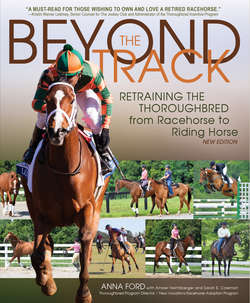Читать книгу Beyond the Track - Anna Morgan Ford - Страница 26
На сайте Литреса книга снята с продажи.
Injury
ОглавлениеRacehorses are most commonly injured as a result of several factors: a physical predisposition; training on poor track surfaces; improper shoeing; lack of fitness; or taking the notorious “bad step” where they end up lame. While some of these can be prevented with correct care, others are simply the result of unavoidable circumstances and must be considered the risk taken when participating in a high-intensity sport.
Human athletes—professional and amateur—also experience injuries or soreness that they deal with regularly. Old injuries can persist throughout an athlete’s lifetime, requiring long-term maintenance with oral medications, nutritional supplements, or alternative treatments like acupuncture and chiropractic. Thoroughbred trainers are used to treating their horses as athletes, and similar modes of care and therapy are employed. In addition, trainers work with veterinarians to rehabilitate horses and maintain soundness. Treatment options improve all the time, but veterinarians are not miracle workers and owners are not always willing, or able, to pay exorbitant costs for medical care.
To be fair, when it comes to injury there are many variables at play and many unknowns to consider: once experienced, an injury might heal, recur, and then become chronic, or it could never be a problem again. An injury might require surgery or other expensive treatment and rehabilitation, or it might be best to just leave it to heal on its own over time.
Whatever the scenario, if an injury is treatable it always comes down to the same questions: will the horse be able to race again, and if so, how competitive will he be? In some cases, the expense of treatment in relation to these two all-important questions, rather than the severity of the injury, forces a horse’s retirement.
Unfortunately, far too many horses that need surgery are retired from the track without adequate treatment. Many of these horses live the rest of their lives with chronic pain. In some cases, the horse’s quality of life is in question and it is debatable whether retirement is the right option or if the horse would be better off humanely euthanized. We take such cases very seriously at New Vocations and are not opposed to humanely euthanizing a horse that will be in pain the remainder of his life.
